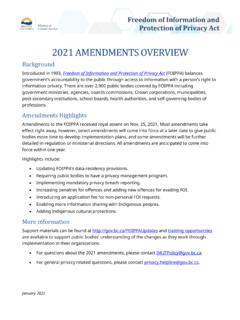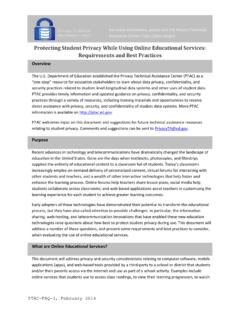Transcription of HOW TO COMPLY WITH THE GRAMM-LEACH-BLILEY ACT
1 HOW TO COMPLY WITH THE GRAMM-LEACH-BLILEYACTThe information contained herein has been providedby Keith E. Whann and Deanna L. Stockamp of thelaw firm Whann & Associates and is for generalinformation purposes only. You should contact legalcounsel for specific application. 2001 Keith E. Whann All Rights ReservedPage 2 TABLE OF CONTENTS overview OF privacy NOTICE AND OPT OUT REQUIREMENTS I. overview .. 3 II. Who is required to COMPLY ?.. 3 III. Understanding the difference between Consumer and Customer .. 5 A. When does a motor vehicle dealership establish a customer relationship? IV. When are you required to provide privacy notices?
2 6 A. The initial privacy notice B. Annual privacy notice to customers V. Information to be included in the initial and annual privacy notices .. 7 A. The initial privacy notice B. Short form initial notice when there is no customer relationship C. Joint notice with other affiliates or financial institutions D. Providing privacy notices to consumers or customers who jointly obtain a service or product E. Revised privacy notices F. Acceptable delivery methods for privacy notices VI. How to COMPLY with the opt out notice requirements .. 11 A. When you must provide the opt out notice B. The opt out notice C.
3 Providing opt out notices to consumers or customers who jointly obtain a service or product D. Effective duration of an opt out decision E. Acceptable methods of delivery for the opt out notice VII. Exceptions to certain notice and opt out requirements .. 13 A. Opt out notice exception for service providers and joint marketers B. Notice and opt out exceptions for processing and servicing transactions C. Other legal exceptions to notice and opt out requirements VIII. Subsequent disclosures and use of information .. 14 A. Subsequent disclosures and use of information provided or received by you under an exception B.
4 Subsequent disclosures and use of information provided you receive or provide other than under an exception IX. What does full compliance by July 1, 2001 mean?.. 15 X. Relationship between federal and state privacy 15 COMPLETING THE INITIAL privacy POLICY AND OPT OUT 16 Introduction Guidelines INITIAL privacy POLICY AND OPT OUT TEMPLATE .. 21 Page 3 overview OF privacy NOTICE AND OPT OUT REQUIREMENTS I. OVERVIEWIn November 1999, President Clinton signed into law S. 900, the Financial Services Modernization Act of 1999, more commonly know as the GRAMM-LEACH-BLILEY Act (G-L-B Act). Federal Agencies with regulatory authority were empowered to adopt and implement rules setting forth, which business entities are subject to the Act and how to COMPLY with its provisions.
5 The Federal Trade Commission (FTC) is the regulatory agency with enforcement authority over motor vehicle dealers and other members of the motor vehicle industry who are not otherwise regulated by another regulatory agency as set forth in the G-L-B Act. The FTC issued a Final Rule implementing the provisions of the G-L-B Act in May 2000. The FTC s Final Rule became effective on November 13, 2000. Full compliance with the G-L-B Act and the Final Rule are required by July 1, 2001. The stated purpose of the G-L-B Act and the FTC s Final Rule is to ensure that financial institutions respect the privacy of theircustomers and protect the security and confidentiality of nonpublic personal information.
6 The definition of a financial institution has been broadly interpreted and will, in most cases, include motor vehicle dealerships. Motor vehicle dealershipsthat fall under the definition of a financial institution are prohibited from disclosing certain personal information about theircustomers to third parties unless they satisfy notice and opt-out requirements. Although the G-L-B Act does not prohibit a financial institution from disclosing nonpublic personal information about a consumer to affiliated parties or require a financialinstitution to provide a consumer with the opportunity to opt-out of such information sharing before doing so, the FTC s Final Rule, the Fair Credit Reporting Act (FCRA) and some state laws impose additional disclosure requirements and limitations on disclosures of nonpublic information to affiliated companies.
7 This overview is intended to explain the G-L-B Act, the FTC s Final Rule, and the FCRA, as well as provide compliance information. It is not intended to address the specific facts and circumstances of every motor vehicle dealership. Specific application of the G-L-B Act, the FTC s Final Rule and the FCRA will vary depending upon how a motor vehicle dealership transacts business. II. WHO IS REQUIRED TO COMPLY ? The G-L-B Act and the FTC s Final Rule govern financial institutions who collect nonpublic personal information about individuals who obtain a financial product or service . The FTC chose to retain a broad definition of financial institution.
8 That definition encompasses retail sellers of goods if they assist consumers in obtaining credit or extend credit themselves. Amotor vehicle dealership is also a financial institution if it, in the regular course of its business, leases motor vehicles on a non-operating basis for longer than 90 days. Like the definition of financial institution, the FTC also adopted broad definitions for financial products or services and nonpublic personal information . The definition of financial products and services includes the financial institution s evaluation of information collected in connection with an application by a consumer for a financial product or service, even ifthe application ultimately is rejected or withdrawn.
9 It also includes the distribution of information about a consumer in obtaining a financial product or service. In some cases, the only product or service offered is the funding of the loan, directlyor indirectly. In other cases, the product or service is the processing of payments, sending account-related notices and responding to consumer inquiries. For example, if your motor vehicle dealership obtains a credit application from an individual and evaluates the information provided in the application to determine whether or not the individual qualifies for financing, you have provided a financial product or service. A motor vehicle dealership also provides a financial product or service if it provides a copy of the application or the information contained therein to another lending institution.
10 Nonpublic Personal Information means any personally identifiable financial information that is provided by a consumer to a financial institution, results from any transaction with the consumer or any financial service performed for the consumer, or information otherwise obtained by the financial institution. Examples of nonpublic personal information include: (1) Information a consumer provides on an application to obtain a loan; (2) Account balance information, payment history and credit card information; (3) The fact that an individual is or has been one of your customers or has obtained a financial product or service from you; (4) Any information that a consumer provides to you that you or your agent otherwise obtain in connection with collecting on or servicing a credit account; Page 4(5) Any information you collect through an Internet cookie (an information collecting device from a web server).







